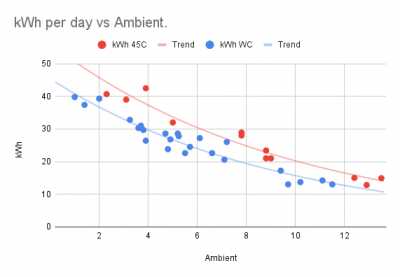Heatgeek and flow temperature YouTube
This is an excellent video that explains why lower flow temperature is the way to go. Balancing heat loss to heat input. I read Chemical Physics at Uni and I hadn’t thought about it like this. Good.
But how does this relate to electric spend?
Having a SCOP of 5+ is fabulous, but if you are spending more on electricity, then it’s of no benefit - except for the heat geeks 😊
So appreciate thoughts. I still plan to run my ASHP on Nest control for a year until April when I will switch to weather compensation for a year to compare.
Daikin Altherma 3H HT 12kWh ASHP with Mixergy h/w cylinder; 4kW solar PV with Solic 200 electric diverter; Honda e and Volvo EX30 Ultra Twin Performance electric vehicles with Myenergi Zappi mk1 & Ohme chargers
drop the nest, you are on a hiding to nothing. it gives no feed back to the pump about required temperatures..
stick with the heat pumps own controller and app
Professional installer
@alec-morrow so I understand the logic, but need the data to confirm. Do you see my point. Running the ASHP at 5+ COP for 24hrs (even with step back) might cost more than How I am running now with Nest.
Where is your evidence for the “hiding to nothing” statement?
Daikin Altherma 3H HT 12kWh ASHP with Mixergy h/w cylinder; 4kW solar PV with Solic 200 electric diverter; Honda e and Volvo EX30 Ultra Twin Performance electric vehicles with Myenergi Zappi mk1 & Ohme chargers
It’s understanding I defer to, I’m a heating engineer.
Turning things off and on inherently create inefficiencies in regularly used spaces. That was tolerable before variable flow temperatures became the optimum way to maintain comfort temperatures.
on-off necessitates a higher than necessary flow temperature to compensate for the off period
Professional installer
@alec-morrow understand your point. And I’m sure you are an experienced heating engineer. And know what you are talking about. But as an ex-scientist and now IT geek, I need the data. That’s why I’m comparing across two years with two different control systems. Not sure it’s statistically accurate though.
Daikin Altherma 3H HT 12kWh ASHP with Mixergy h/w cylinder; 4kW solar PV with Solic 200 electric diverter; Honda e and Volvo EX30 Ultra Twin Performance electric vehicles with Myenergi Zappi mk1 & Ohme chargers
Posted by: @julianc@alec-morrow understand your point. And I’m sure you are an experienced heating engineer. And know what you are talking about. But as an ex-scientist and now IT geek, I need the data. That’s why I’m comparing across two years with two different control systems. Not sure it’s statistically accurate though.
Julian,
I fear your experiment will only work if the weather and temperatures are the same for each year. I suspect that they may not be. 🙃
@derek-m it’s a good point well made. Not sure what else to do?
Daikin Altherma 3H HT 12kWh ASHP with Mixergy h/w cylinder; 4kW solar PV with Solic 200 electric diverter; Honda e and Volvo EX30 Ultra Twin Performance electric vehicles with Myenergi Zappi mk1 & Ohme chargers
Posted by: @julianc@derek-m it’s a good point well made. Not sure what else to do?
You can look up degree days for both your years and adjust. There are a couple or three sites but this one will do it.
You could also plot outside temp vs energy consumed on a scatter diagram and compare the two years. Like I did here to compare using thermostats with weather comp.
Posted by: @julianc@alec-morrow understand your point. And I’m sure you are an experienced heating engineer. And know what you are talking about. But as an ex-scientist and now IT geek, I need the data. That’s why I’m comparing across two years with two different control systems. Not sure it’s statistically accurate though.
oh dear… I feel for you!
There have been comparisons done by people here, savings of not using an On-Off has been seen here to be around 20-25%
Professional installer
Posted by: @julianc@alec-morrow so I understand the logic, but need the data to confirm. Do you see my point. Running the ASHP at 5+ COP for 24hrs (even with step back) might cost more than How I am running now with Nest.
Where is your evidence for the “hiding to nothing” statement?
Hi Julian,
The problem with any home based test is that there are so many variables that are not being measured and hence cannot be taken into account in the final results.
Since you believe in maths and physics, maybe I can prove to you that what Alec is saying is actually true.
Looking at the data for Kev's system, the heat demand at an outdoor air temperature of 7C is 4304W at a water flow temperature of 34.3C, and a COP of 4.6, which would require an electrical energy input of 936W. So if his heat pump runs constantly for 1 hour then the energy used would be 936Wh.
If instead of running continuously for the full hour, the heat pump runs for 40 minutes and then stops for 20 minutes, then the heat emitted into the property would be 2689W at the above water flow temperature. So the indoor air temperature would start to fall.
To maintain the indoor air temperature requires that 4304W is emitted during the 40 minute period, which would equate to a heat energy output of 6456W from the heat pump. To achieve this level of output the heat pump would need to operate at a water flow temperature of 39.2C, at a COP of 3.93 and electrical energy input of 1642W. Because the heat pump is only running for 40 minutes, the power used is 1095W.
So if running the heat pump at a higher temperature but for a shorter length of time uses 1095Wh, and running it continuously at a lower water flow temperature uses 936Wh, then the energy consumption is almost 17% greater with the on-off method.
I hope this answer your question.
@derek-m thank you Derek. Fantastic explanation. I do take your point about all the variables too.
I will think on this more. But it suggests I need to end my annual Nest control trial and move over to weather compensation sooner.
Thank you
Daikin Altherma 3H HT 12kWh ASHP with Mixergy h/w cylinder; 4kW solar PV with Solic 200 electric diverter; Honda e and Volvo EX30 Ultra Twin Performance electric vehicles with Myenergi Zappi mk1 & Ohme chargers
@julianc I think I remember you saying you'd bought a Daikin maintenance and service pack. Which one did you get and has it proved to be a good investment ?
- 27 Forums
- 2,495 Topics
- 57.8 K Posts
- 345 Online
- 6,220 Members
Join Us!
Worth Watching
Latest Posts
-
RE: What determines the SOC of a battery?
@batpred I didn't write the Seplos BMS software, I a...
By Bash , 11 minutes ago
-

RE: Electricity price predictions
Sorry to derail this thread ‘slightly?’ but back to the...
By Toodles , 20 minutes ago
-

RE: Humidity, or lack thereof... is my heat pump making rooms drier?
Without knowing it, @andrewj, you've laid down the gaun...
By Majordennisbloodnok , 39 minutes ago
-
RE: Testing new controls/monitoring for Midea Clone ASHP
@tasos and @cathoderay thanks. I have some history grap...
By benson , 43 minutes ago
-

I am having my existing heat pump changed to a Vaillant...
By trebor12345 , 1 hour ago
-
Our Experience installing a heat pump into a Grade 2 Listed stone house
First want to thank everybody who has contributed to th...
By Travellingwave , 2 hours ago
-
RE: Setback savings - fact or fiction?
@cathoderay The input power is largely determined by...
By RobS , 2 hours ago
-

RE: Solis inverters S6-EH1P: pros and cons and battery options
Just to wrap this up here for future readers: The S...
By Batpred , 4 hours ago
-
RE: Struggling to get CoP above 3 with 6 kw Ecodan ASHP
Welcome to the forums.I assume that you're getting the ...
By Sheriff Fatman , 4 hours ago
-
RE: Say hello and introduce yourself
@editor @kev1964-irl This discussion might be best had ...
By GC61 , 6 hours ago
-

@painter26 — as @jamespa says, it's for filling and re-...
By cathodeRay , 10 hours ago
-

RE: Oversized 10.5kW Grant Aerona Heat Pump on Microbore Pipes and Undersized Rads
@uknick TBH if I were taking the floor up ...
By JamesPa , 20 hours ago
-

RE: Getting ready for export with a BESS
I would have not got it if it was that tight
By Batpred , 22 hours ago
-
RE: Need help maximising COP of 3.5kW Valiant Aerotherm heat pump
@judith thanks Judith. Confirmation appreciated. The ...
By DavidB , 1 day ago
-

RE: Recommended home battery inverters + regulatory matters - help requested
That makes sense. I thought better to comment in this t...
By Batpred , 1 day ago
-
Bosch CS5800i 7kW replacing Greenstar Junior 28i
My heat pump journey began a couple of years ago when I...
By Slartibartfast , 1 day ago
-

RE: How to control DHW with Honeywell EvoHome on Trianco ActiveAir 5 kW ASHP
The last photo is defrost for sure (or cooling, but pre...
By JamesPa , 1 day ago
-

RE: Plug and play solar. Thoughts?
Essentially, this just needed legislation. In Germany t...
By Batpred , 1 day ago
-
RE: A Smarter Smart Controller from Homely?
@toodles Intentional opening of any warranty “can of wo...
By Papahuhu , 1 day ago
-
RE: Safety update; RCBOs supplying inverters or storage batteries
Thanks @transparent Thankyou for your advic...
By Bash , 1 day ago
-
RE: Air source heat pump roll call – what heat pump brand and model do you have?
Forum Handle: Odd_LionManufacturer: SamsungModel: Samsu...
By Odd_Lion , 1 day ago
-
RE: Configuring third party dongle for Ecodan local control
Well, it was mentioned before in the early pos...
By F1p , 2 days ago
-

RE: DIY solar upgrade - Considering adding more panels
I know this is a bit old, but it made me wonder what co...
By Batpred , 2 days ago




